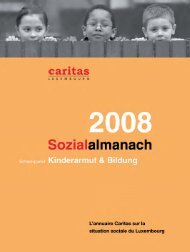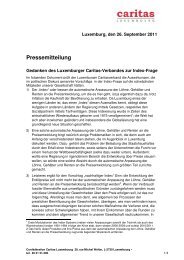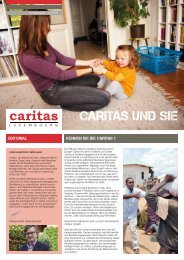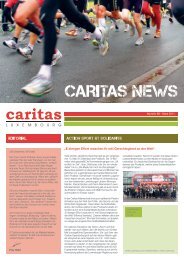Sozialalmanach - Caritas Luxembourg
Sozialalmanach - Caritas Luxembourg
Sozialalmanach - Caritas Luxembourg
You also want an ePaper? Increase the reach of your titles
YUMPU automatically turns print PDFs into web optimized ePapers that Google loves.
arrangements. Any solution to the crisis has to be both effective and legitimate at level of<br />
supranational economic institutions as well as at the level of the nation-state. There should<br />
be a ‘goodness of fit’ between international economic governance and national social and<br />
economic policy space. Most markets must remain primarily embedded at the level of the<br />
nation-state, as long as democratic governance and political identities remain nationally<br />
embedded. Economic relations between states should be structured with the aim of opening<br />
up trade and investment flows subject to the proviso of maintaining heterogeneous national<br />
arrangements. Where national models conflict, ‘traffic rules’ must be designed to manage<br />
the interface between domestic arrangements. Protected policy space would allow rich<br />
countries to provide social insurance, address concerns about labour, environmental, health,<br />
and safety consequences of trade, and also shorten the ‘chain’ of delegation. Meanwhile,<br />
poor nations should be enabled to position themselves to benefit from globalisation through<br />
economic restructuring. All nations must be given the space to create financial systems and<br />
regulatory structures attuned to their own conditions and needs. To this effect, substantive<br />
policy concerns would be brought to the table of international economic negotiations.<br />
Surely, this goes beyond the neo-liberal zeal to establish ‘level playing fields’.<br />
The global crisis has laid bare important changes in the global distribution of wealth<br />
and power. The power of the US is on the wane, and emerging economies such as India<br />
and China have meanwhile become key global economic players. However, their economic<br />
prowess is not yet reflected by their share in international bodies. At the same time, the EU<br />
is faced with a plethora of internal problems in the wake of Eastern enlargement. Quite<br />
surprisingly, the international community is already adjusting to this new multilateral reality.<br />
Whereas existing institutions usually continue to reflect the international distribution of<br />
power of the status quo ex ante, the IMF and the World Bank have recently allowed for<br />
far more domestic heterodoxy than ever before. The crisis has changed these institutions<br />
practically overnight. In terms of substance, the Washington Consensus rules no longer<br />
govern, and Dominique Strauss-Kahn, director of the IMF, realised that without change,<br />
China and other emerging economies would not stay engaged and therefore demonstrated<br />
flexibility in reform.<br />
Since the economic crisis, the supranational Bretton Woods organisations that converted<br />
to the Washington Consensus, such as the IMF, the World Bank, and the WTO, have faced<br />
a crisis of legitimacy. In order for these global organisations to recover, they must reform<br />
by, firstly, fully integrating the emerging countries, and secondly, promoting equitable and<br />
sustainable models of globalisation. By 2009, in institutional terms, the elite club of rich<br />
industrial nations, known as the G7 – Britain, Canada, France, Germany, Italy, Japan and<br />
the United States, has been permanently, replaced by the group of 20, including China,<br />
Brazil, India and other fast growing developing countries, as a global forum for economic<br />
policy. The rise of the G20 marks an instance of profound institutional change. However,<br />
169








